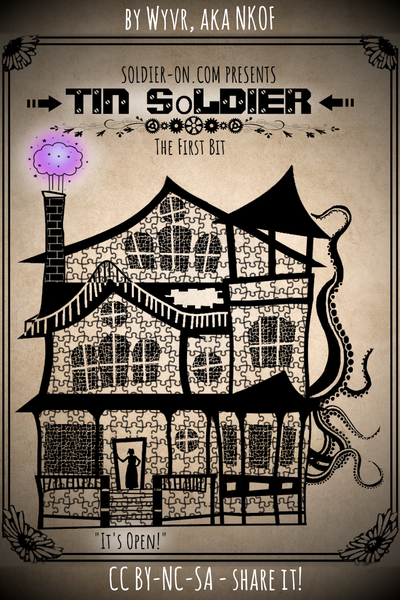“…two-hundred pounds, and much taller,” the darker boy was saying, while gesturing. “I mean, you must realize, we were in the hospital when they did that sketch, and Edward could hardly talk.”
Pressed for confirmation, Edward replied in a dull voice, “It’s not him.”
“If you’d like to redo the sketch, I’m sure I’d do a much better job of it now.”
“Not much point,” the policewoman said. “The chances were never very good. Even this was a long shot. I am sorry, sir.”
“Oh, no, I completely understand. There are a lot of red magicians in the city, aren’t there?”
“A good few. I suppose we could do with less.”
“Ha, ha,” said the dark boy.
“It’s not him,” Edward muttered, looking away. He was already halfway down the street, it was just that his feet hadn’t managed to get him there yet.
“Have a good afternoon, gentlemen,” the policewoman said, and the bell went again.
“Ed…” said the dark boy, reaching a hand.
Edward pushed him off. “Just don’t. I did what you wanted, just don’t.” He addressed Hyacinth with cold eyes and a snarl, “You tell that man if I ever see him again I’ll kill him. I don’t need the police for that.” He walked away.
“Ed…” said the dark boy. He sighed and turned to follow.
“Wait!” said Hyacinth, rising. And… she had completely forgotten the name. It was just gone. “Sea Turtle!” she called.
The darker boy turned and looked down.
“You said it wasn’t him?”
“Yeah.”
“Why?”
“Don’t know.”
Yeah, you know, thought Hyacinth. Whether it was because he felt grateful to her or he actually felt bad about what he’d done, she’d never get it out of him and it didn’t really matter.
“I-I may regret this later,” she said, “but right now, I’m just so damned relieved, I’d like to shake your hand.” She took one of his in both of hers. He allowed it, while still looking down and away. She was used to that sort of thing, guilty people were a little like Milo.
“How is…” He looked up and then away again. “I’m sorry, you never said the name.”
“The boy? His name is Erik.”
“He’s alive?”
Hyacinth nodded. “He has his difficulties, but he’s coming along.”
“That’s his father?”
“Not really, but close enough.”
He opened his mouth and he didn’t know what was going to come out. ‘I’m sorry,’ did not seem adequate for the situation. He was sorry, but he was also a lot of other things, confused being foremost, ashamed being paramount. “I wish them well.” He turned and made another attempt to extricate himself.
“Wait a minute, Sea Turtle,” Hyacinth said. “What do I call you if I see you again?”
“Sea Turtle is all right,” he admitted. “But if you ever need anything, my name is John Green-Tara. I live on Herald Street.”
“John Green-Tara?”
“Immigrant parents,” he replied automatically.
“Oh, I see.” Hyacinth recollected the woman in the green dress might’ve been a little dark too, but it could’ve been the torchlight. What could you tell from dark, anyway? People moved all over.
Then you look at someone like Sanaam, he sure looked different, but he never stayed in one place long enough to be from anywhere. His wife and his child and his politics were Marselline.
While Hyacinth was musing on race relations, the General stepped up with a request, “John Green-Tara, I do not know if this will ease your conscience, or even indeed if it deserves to be eased, but we could use some paint.”
He nodded.
“Or metal,” Hyacinth added. “Metal is always good.”
“People are always bringing you metal, Hyacinth.” She turned back to the boy, “Bring us paint.”
He nodded, and if he had any military in his background, he might’ve saluted. In any case, he departed as one on a mission.
“I like what we have now,” Hyacinth told the General.
“What we have now is an obscenity,” the General replied.
They had gotten hold of a little paint. It was white paint, and what they had wouldn’t have covered the scrawl that the rioters had left, so Hyacinth had simply made an addition. The wall now read MAGICIANS in red, with an arrow pointing to the house, and ASSHOLES in white, with an arrow pointing to the street.
They went into the police station together (engaging that damn bell again) and attempted to negotiate Mordecai’s release. He did not make it easy on them. He still wouldn’t talk. He didn’t seem to believe that they wanted to let him go.
Hyacinth finally commandeered a memo slip from the front desk and wrote his name on it. M-O-R-D-E-C-A-I… “What was it, sir?”
“Eidel,” she replied. “No, Hyacinth, not that way.”
MORDECAI ID (scribbled out) EIDEL called, the slip eventually read, regarding YOUR SICK CHILD WOULD LIKE YOU TO COME HOME NOW! Hyacinth also checked the box that said URGENT.
She tore it off the pad and gave it to the man at the desk. “Look, will you give that to him and tell him to nod if that is his name? I want him out of here as much as you do.”
That got him out of there. He was not in what you would call real good shape when he was returned to them, but it got him out of there. Even the General could see how he might’ve been reluctant to believe that they were going to let him go.
They had mostly stayed away from his face, but a couple of good shots were enough to have laid open his cheek and run a large amount of red down the front of his shirt from his nose and mouth. They had done him enough damage otherwise that he was limping, and he would not unwrap his arms from around his middle so they could help him walk.
Honestly, the General thought, why would you hit someone in the face and then bring in people to identify them? That was a failure of basic logic. The police force in this city could do with a little military discipline.
“Mordecai, what the hell happened?” said Hyacinth, which may have been a little more humane.
“I fell down some stairs,” he muttered. He wiped his mouth on his sleeve, which improved neither.
“What stairs?” said Hyacinth.
He picked up his head and glared at her, “I fell down some stairs at the house.”
“Oh, right,” Hyacinth allowed.
They were not going to let him on a bus looking like that, not at one in the afternoon on a weekday. (At midnight on a Sigurd’s Day, he might’ve blended in.) They fed coins into a pay toilet and Hyacinth crammed herself in there with him while the General stood outside holding two purses and looking awkward. They flushed two helpings of reddened wet tissue and emerged looking somewhat improved.
“I don’t know how in the hell Milo used to change clothes in those things,” Hyacinth commented, aside.
The shirt was still a total loss, and the General, in her greatcoat, was the only one with clothing to spare. It would’ve fit two of him sideways and been adequate for three-quarters of him lengthwise.
“Can we tie it?” said Hyacinth, adjusting him. “Let’s tie it. Oh.” It didn’t look any better tied, but it did look better than a bloody white shirt.
“Just a moment,” the General said. She put her hand on the sleeve (also on Mordecai’s arm, which made him blink and look up). Amid subtle curls of white smoke, the sleeves and the hem lengthened and the slack in the body disappeared. It smelled like an iron with the setting a little too high for the fabric. “Out of respect for the uniform,” she explained.
“I knew you could alter things!” Hyacinth cried.
“I never said I couldn’t,” the General replied.
Mordecai peered narrowly at the ribbons on the breast. “You’ve got an Imperial Medal of Honour?” he asked. He might be forgiven a little absurdity after the morning he’d had.
“Just the one,” the General said, smiling.
On the way to the bus stop, they came within three paces of an impeccably coiffured woman who was walking a small rat in a sweater on a leash. Except it was not a rat. It would have been all right if it was a rat. It was a dog. Mordecai would have known to cross to the other side of the street — if he were looking where they were going or trusted to make those sorts of decisions in his condition.
“Get that thing away from my Gigi!” the coiffured woman snarled, snatching up her Gigi and putting it directly next to her face.
Mordecai made a valiant effort, but managed to get only a half-step away before knocking into Hyacinth.
Gigi promptly bit its caretaker on the nose and, when dropped, took off running down the nearest alley, dragging its glitter-encrusted leash behind it.
“Ow! You little bitch!” the woman cried, before quickly amending, “Gigi! Momma is sorry!” and running off after it. In heels.
“No dogs,” Mordecai informed the two women beside him. It was written on the side of the damn house!
“Sorry,” Hyacinth managed. She was uncertain whether or not this was funny. It was certainly annoying.
“Walk faster, sometimes they come back,” Mordecai said.
“What could you possibly be afraid it is going to do to you?” Hyacinth said.
“I don’t know!” he snapped. “But haven’t I had enough done to me today?”
“Quite so,” the General said, quickening her pace.
The bus ride home was uneventful. There were no dogs allowed on the bus. Mordecai kept touching the staples Hyacinth had put in his cheek. (She’d used a penny.) Every time he did it, she’d pull his hand down.
Finally she tsked and said, “Listen, it’s swelling and he is going to notice it. We’ll just tell him it was stairs, like you said.”
“That’s not comforting,” he said.
“I wasn’t trying to be comforting, I was trying to get you to leave it alone. Now leave it alone!”
He was disheartened enough to leave it alone.











Comments (0)
See all